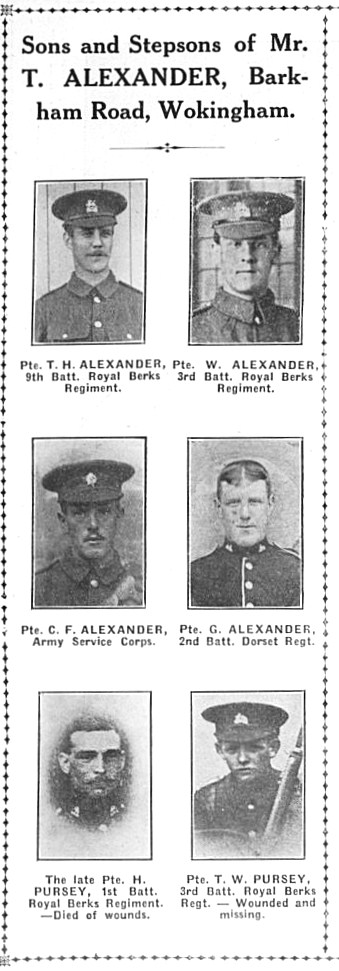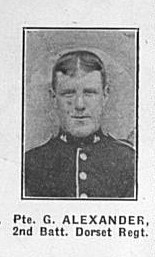Born in Wokingham in 1893 George was one of 6 siblings (Charles, Alsie, Edith, William, Joseph) born to Mary and Thomas Alexander.
In 1911 the family lived in Brookside Cottages in Barkham Road, Wokingham and young George William was already a private in the 2nd Battalion, Dorset Regiment. He had joined up in Aldershot before 1911 so was set on a career in the Army.

George was part of the much larger Alexander family who went to war
At the start of the First world war the 2nd Bn Dorsets were stationed in India and after the hostilities commenced the Regiment were to sail for Europe only to be diverted to the Persian Gulf where they arrived in Bahrain on October 23rd 1914. They fought throughout the next few years in very inhospitable conditions throughout Mesopotamia, in what today is Iraq.
We do not know the details of George’s death in 23 July 1916, but the battalion history tells that during July and August 1916 150 men were hospitalized for various illness and a number died thereof. His name is on the Basra Memorial and he has no known grave.
Here is a description of the conditions for the Dorsets in Mesopotamia in 1914:
“Dec. I was standing on the bridge in the evening when the Medjidieh arrived. She had two steel barges, without any protection against the rain, as far as I remember. As this ship, with two barges, came up to us I saw that she was absolutely packed, and the barges too, with men. The barges were slipped, and the Medjidieh was brought alongside the Varela. When she was about 300 or 400 yards off it looked as if she was festooned with ropes. The stench when she was close was quite definite, and I found that what I mistook for ropes were dried stalactites of human faeces The patients were so huddled and crowded together on the ship that they could not perform the offices of nature clear of the edge of the ship, and the whole of the ship’s side was covered with stalactites of human faeces. This is what I then saw. A certain number of men were standing and kneeling on the immediate perimeter of the ship. Then we found a mass of men huddled up anyhow, some with blankets and some without. They were lying in a pool of dysentery about 30 feet square. They were covered with dysentery and dejecta generally from head to foot. With regard to the first man I examined, I put my hand into his trousers, and I thought that he had a haemorrhage. His trousers were full almost to his waist with something warm and slimy. I took my hand out, and thought it was blood clot. It was dysentery. The man had a fractured thigh, and his thigh was perforated in five or six places. He had apparently been writhing about the deck of the ship.
Many cases were almost as bad. There were a certain number of cases of terribly bad bedsores. In my report I describe mercilessly to the Government of India how I found men with their limbs splinted with wood strips from ‘Johnny Walker’ whisky boxes, ‘Bhoosa’ wire, and that sort of thing” Major R Markham Carter, in Mesopotamia Report
Four of the sons were to die, including the Pursey brothers, the sons from Maryan’s first marriage.
Notes on research
There is both tragedy and wonderment at these two families. Two Pursey brothers and two Alexander brothers were killed in WW1. Following the death of Charles Pursey and Mary Ann Alexander, the two remaining heads of the family married and turned seventeen children into stepbrothers and stepsisters. Six of those children were under sixteen at the time for their parents’ death and eleven were adults. During the time of close communities (i.e. pre 20th century) many widows and widowers remarried in order to bring up large families. However, with so many adults all being able to contribute time and income to the respective Pursey and Alexander families, this may have been a match made not by necessity, but preference. This makes the loss of four sons even more painful.
Tread carefully with this tree. Whilst it has been built with a level of care, experience of close knit communities means individuals cast on the tree as brothers and sisters can be cousins. Names in these vast extended families can be duplicated many times over. That said, have a look at the Wokingham Remembers constructed tree on the following link:
Click to see:
THE ALEXANDER / Pursey FAMILY Quick tip: You come to a list of contents. Once you click on your choice of information, you might not see anything change and therefore will need to scroll down with your mouese or cursor to see the results of your selection.


